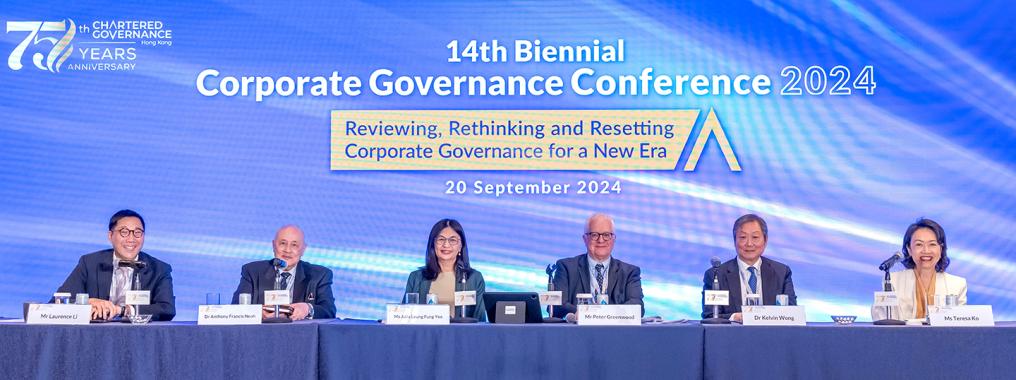
Retirement age – a sustainability governance issue
How old is too old?
The Institute’s latest research report focuses on the all-important issue of retirement age. CGj provides a snapshot of the background to the report, the associated sustainability governance themes and the results of a survey of approximately 1,300 individuals on the topic.
Highlights
- retirement is a key sustainability governance concern that is relevant to the issue of succession planning, impacting business continuity and operational resilience, and is of significance to all stakeholders
- over half the survey respondents believe the retirement age in Hong Kong should be 65 years or more, contingent on whether the employee is able to fulfil their duties properly, and the majority feel the current model of mutually agreed contractual arrangements for retirement should be retained
- governance professionals can play a pivotal role in helping their organisations rethink the retirement age, particularly in light of the ageing of society and the goal set by SDG 8 to provide fair work for all, including seniors
The question of retirement, and its impact on succession planning, lies at the heart of the Institute’s latest thought leadership research paper, titled Retirement – A Sustainability Governance Issue: Retirement Age and a Managed Process, published in June 2024, in which the opinions of approximately 1,300 individuals were canvased to collate and analyse thoughts on retirement. The Institute views this as a key sustainability governance concern.
A great deal of attention is being paid to the views and skill sets of the younger generation – the next up-and-coming business leaders – but what can be said in favour of the older generation, with their many years of experience, and their honed responses and opinions? The value of senior employees’ insights, knowledge and skills should not be overlooked. As President David Simmonds FCG HKFCG points out in his foreword to the report: ‘From a governance standpoint, organisations need to carefully balance the valuable contributions of senior staff members with the new perspectives of younger employees as part of succession planning.’
Background
According to World Health Organisation statistics, our global population is ageing at an unprecedented rate. The percentage of people worldwide over 60 years of age is predicted to rise to 22% by 2050, compared with 12% in 2015. In Hong Kong, the Census and Statistics Department projects that the number of senior citizens will almost double, from 1.45 million in 2021 to 2.74 million in 2046, meaning that, two decades from now, seniors will make up more than one in three of the Hong Kong population. This is partly the result of a discernable fall in birth rates, and partly due to the fact that people are expected to live longer thanks to medical advances.
“two decades from now, seniors will make up more than one in three of the Hong Kong population”

The United Nations’ Sustainable Development Goal 8 (UN SDG 8) promulgates ‘sustained, inclusive and sustainable economic growth, full and productive employment and decent work for all’. This therefore puts retirement age firmly in the governance spotlight, as an important issue relating to succession planning for business strategy and operational resilience. As Edith Shih FCG(CS, CGP) HKFCG(CS, CGP) (PE), Honorary Adviser to Council, Past International President and Past President, notes in her foreword to the report: ‘The decisions of organisations on when employees should retire, where permitted, impact succession planning and the wider UN SDG 8 on employment opportunities for all, including seniors.’
With all this in mind, the Institute began its latest thought leadership study by first considering different retirement age models in different jurisdictions, before conducting its survey of the opinions held in Hong Kong on the question of retirement age.
International and local retirement regimes
There is no universal model for retirement age, as the report clarifies. In the Chinese mainland, for example, the statutory retirement age in state-owned enterprises (SOEs) is currently relatively low (60 for men, and between 50 and 55 for women), however retirees are entitled to state pensions. A caveat to this is that if an employee is working in an SOE that is conducting business outside the mainland, the retirement age depends on the local jurisdiction.
In Singapore there is a statutory retirement age of 68, moving to 70, while in some other countries ‘any contractual agreement or regulations to impose a retirement age is a form of age discrimination (or ageism)’ and is considered unlawful, the report explains. Ageism is generally banned in the UK under the 2010 Equality Act, while Canada, Australia, New Zealand and the US also operate under this anti-ageism model.
The Hong Kong position
Hong Kong does not have a statutory retirement age, nor are there any laws specifically prohibiting age discrimination in the workplace. Instead, parties are allowed to freely contract on the retirement arrangements on mutually agreed terms.
However, against a backdrop of an ageing population and a shrinking workforce, finding fresh talent is becoming more difficult. As the report recommends: ‘Firms must contemplate the option of temporarily or permanently retaining some senior personnel.’ In alignment with SDG 8, the government has provided the impetus for organisations to retain the benefits of productive senior staff by raising the retirement age of civil servants to up to 65, and in some cases up to 70 for some judges.
It is worth bearing in mind that, in Hong Kong, ‘an organisation should be able to replace a non-performing employee who does not meet job specifications regardless of retirement age,’ the report remarks. Equally, as long as someone continues to contribute positively to the organisation – conditional upon operational needs – there is nothing set in legislative stone to require an enforced retirement at a specific age.
Hong Kong faces one additional difficulty, which is that – unlike the state pension provided in the Chinese mainland, as mentioned above – the Mandatory Provident Fund is only intended to be a supplement to retirement, and does not in itself ‘allow dignified retirement’. The longer people work, the less strain it is on the public purse, which also enables people to better fend for themselves.
Survey results
‘The survey of 1,293 respondents on retirement age policies in Hong Kong reveals a wealth of information,’ the report states. Of those who responded to the survey, 41% were ‘governance professionals’, followed by 24% ‘other senior management’ and 23% ‘other’. Just over half the respondents were from unlisted companies (53%), while of those from listed companies, 76% were listed on the Main Board of The Stock Exchange of Hong Kong Limited.
An overwhelming majority (82%) of survey participants agreed with the proposition that Hong Kong should retain its current model, allowing parties to freely determine when they retire through contractual arrangements, ‘emphasising flexibility and individual autonomy in retirement decisions’, with only 14% saying there should be some statutory requirements imposed, to ensure fairness and consistency.
When asked about the appropriate age for retirement, 36% felt that employees should continue working as long as they are able to properly fulfil their duties, with 21% giving the age of 65. A further 20% said the employer should determine the retirement age based on organisational needs.
The vast majority (91%) indicated that there should be structured discussions before retirement, and 61% of those signified their preference for these discussions to occur at least a year before retirement, stressing the need for early engagement for a smooth transition and more effective succession planning. As noted by the report: ‘Starting discussions a year in advance allows for comprehensive retirement planning, collaboratively addressing succession strategies and knowledge transfer.’ In terms of what respondents regard as salient items for employers to consider prior to retirement, 40% flagged up the strategic importance of extending retirement age based on operational needs to ‘maintain continuity and leverage the expertise of seasoned professionals to drive business success’, the report observes. In addition, the provision of postretirement part-time employment opportunities and the facilitation of retraining opportunities were given prominence.
As many as 85% of survey participants favoured the establishment of standardised guidelines for companies to follow when handling retirement transitions, ‘citing the importance of ensuring fairness and consistency in retirement processes across organisations’, while also prioritising practicality, industry relevance and ongoing evaluation. Three-quarters also strongly supported having government-sponsored programmes for retraining and upskilling employees transitioning to new roles after retirement.
One concerning view revealed by the survey was that a substantial proportion of respondents described employee awareness and understanding of retirement policies as low (41%) or moderate (47%), with only 11% rating this factor as high. The report suggests this finding ‘highlights a potential knowledge gap that could impact employee retirement planning and decision-making’.
How a governance professional can help
Given that retirement age and succession planning are critical sustainability and ESG considerations to ensure business continuity and operational resilience – particularly for organisations working across multiple jurisdictions and in light of the SDG 8 goal to provide fair work for all, including seniors – governance professionals will be increasingly called upon to help their organisations navigate the new retirement landscape as society continues to age.
Rethinking the retirement age
Governance professionals are well placed to help their organisations rethink the retirement issue, in particular whether adopting the civil service regime of a statutory limit of 65 would be appropriate for the organisation, whether to disregard a set cut-off age in place of continued individual contractual arrangements, or even to use the age of 65 as a reset mechanism for post-retirement full- or part-time employment on a mutually agreed basis for operational needs – as long as performance obligations are met.
Managing the process
Devising and implementing a coherent retirement management process would be a valuable applied governance tool for the governance professional. Survey results demonstrate the need for clear and honest conversations up to a year prior to an anticipated retirement, allowing for comprehensive retirement planning, and to collaboratively address succession strategies and knowledge transfer.
Adopting policies and procedures
Governance professionals can facilitate their organisation’s adoption of explicit retirement-related polices and procedures for a structured, open and transparent retirement management process, as well as foster greater awareness and understanding of the retirement policies, thereby contributing to sustainable business operations.
Conclusions
Retirement relates to sustainability and succession planning, and is an important sustainability governance issue that is relevant to all stakeholders, including employers, employees and the government. ‘There is a need to rethink the idea of “retirement age” and manage the process to provide productive employment, decent work for all and sustainability-related benefits to organisations,’ the report concludes.
Acknowledgements
The Institute would like to thank all those involved in the publication of the report reviewed in this article.
- Edith Shih FCG(CS, CGP) HKFCG(CS, CGP)(PE), Honorary Adviser to Council, Past International President and Past President, and Executive Director and Company Secretary, CK Hutchison Holdings Ltd
- David Simmonds FCG HKFCG, President, and Chief Strategy, Sustainability & Governance Officer, CLP Holdings Ltd
- Michael Ling FCG HKFCG, Chairman of the Technical Consultation Panel, and Joint Company Secretary, CLP Holdings Ltd
- April Chan FCG HKFCG, Past President
- Ellie Pang FCG HKFCG(PE), Chief Executive
- Members of the Technical Consultation Panel
- Mohan Datwani FCG HKFCG(PE), Deputy Chief Executive (author of the report)
If you have any comments and/or suggestions relating to the Institute’s thought leadership, please contact: mohan.datwani@hkcgi.org.hk.
Other Institute research papers in 2024
The Institute’s other research papers published in calendar 2024 are set out below. The Institute would like to thank everyone involved in their production.
Supply Chain Management – An Introduction & Applied Governance Perspectives
Published in June 2024, in collaboration with Deloitte China, this report introduces broad concepts related to supply chain management to help governance professionals become more knowledgeable in this field, enabling them to offer practical advice and implement appropriate governance practices.
2023 Annual Observation for the Compliance of Companies Listed in Hong Kong
The Institute and Clifford Chance LLP jointly published a Chinese-language report in April 2024 to assist companies to enhance their information disclosure and corporate governance practices, and to facilitate practitioners’ understanding of the latest developments and future trends in regulatory thinking.
Interpretation of Amendments to the Hong Kong IPO Regulations for Year 2023
Also in April 2024, the Institute and Clifford Chance LLP jointly published this research report to provide practical guidance to Chinese mainland companies looking to list in Hong Kong, highlighting the latest regulatory developments and trends, and to help practitioners better prepare for the listing process in Hong Kong.
The above research reports are available from the Research Papers page under the Thought Leadership section of the Institute’s website: www.hkcgi.org.hk.


